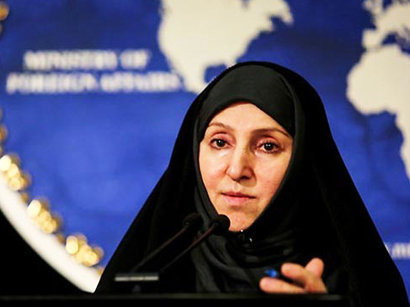Iran’s foreign policy foundations to be unchanged,Foreign ministry says

By Sara Rajabova
The Vienna nuclear deal signed between the P5+1 group of countries and Iran has eased the tense relations between the West and Tehran.
Following the agreement, even countries that once were strong critics of the Islamic Republic, have started to mend the broken ties with the country.
The United Kingdom has recently reopened its embassy in Tehran, while Germany is eyeing a restoration of political ties with Iran.
Other European countries are also seeking to normalize relations with the Islamic Republic and especially develop economic ties with the energy-rich country after the removal of the sanctions.
In the background of these developments, it is expected that the Islamic Republic also will make changes to its foreign policy, mainly towards the West, which has regarded Tehran as enemy for a long time.
On the other hand, despite these normalization efforts, Washington’s policy toward Tehran still remains the same. In the meantime, Iran has no intention to quickly restore relations with the U.S. after nearly 30 years of enmity.
Foreign Ministry Spokesperson Marziyeh Afkham said on August 26 that the foundations of Iran’s foreign policy would not to change.
She said the Supreme Leader of the Islamic Revolution has stressed that all inroads for the U.S. to infiltrate into the country after the nuclear agreement should be blocked.
Afkham said all statesmen adhere to Iran’s unwavering foreign policy and safeguard national its interests and security.
She stressed that it is not the case in Iran that officials could follow a fluid and changing foreign policy, but rather they have to work based on the main principle of mutual respect and lack of interference in the internal affairs of other countries.
Iran’s priority in foreign policy is cooperation with Gulf states, according to the Iranian diplomat.
Though Tehran doesn’t eye normalization of ties with Washington, it demanded that the United States release detained Iranians in the country.
Afkham said there are dozens of Iranians in the U.S. imprisoned on sanctions-related charges.
"Some Iranians released from imprisonment have been under supervision for long time and Iran wants to have consular access to both imprisoned and released Iranians in the U.S.," she said.
In addition to the 19 Iranians jailed on sanctions-related charges, Iran says another 60 Iranians are held for ordinary crimes in the U.S.
Iran also has jailed three Americans including Jason Rezaian, the Washington Post's journalist in Tehran, as well as former Marine Amir Hekmati, and Saeed Abedini, an American Christian pastor.
Meanwhile, Iran’s policy towards Israel remains unchanged, according to Afkham.
Iran’s semi-official Fars News Agency quoted British Foreign Secretary Philip Hammond as saying “Iran’s position with Israel has changed a little” and that “Iran is no longer a threat to Israel,” causing controversy inside the country.
Afkham noted that the controversy surrounding Hammond’s words is media speculation, underlining that mutual ties, regional and global issues, as well as fighting terrorism and extremism were the only topics discussed during Hammond’s Tehran visit.
Similar disputes were raised in Iran during last month’s visit of German Vice Chancellor Sigmar Gabriel to Tehran.
Some media reported that during his visit, Sigmar had urged the Islamic Republic to improve relations with Israel if it wanted to form closer economic ties with Germany. However, Iran rejected these reports.
--
Sara Rajabova is AzerNews’ staff journalist, follow her on
Twitter: @SaraRajabova
Follow us on Twitter @AzerNewsAz
Here we are to serve you with news right now. It does not cost much, but worth your attention.
Choose to support open, independent, quality journalism and subscribe on a monthly basis.
By subscribing to our online newspaper, you can have full digital access to all news, analysis, and much more.
You can also follow AzerNEWS on Twitter @AzerNewsAz or Facebook @AzerNewsNewspaper
Thank you!
